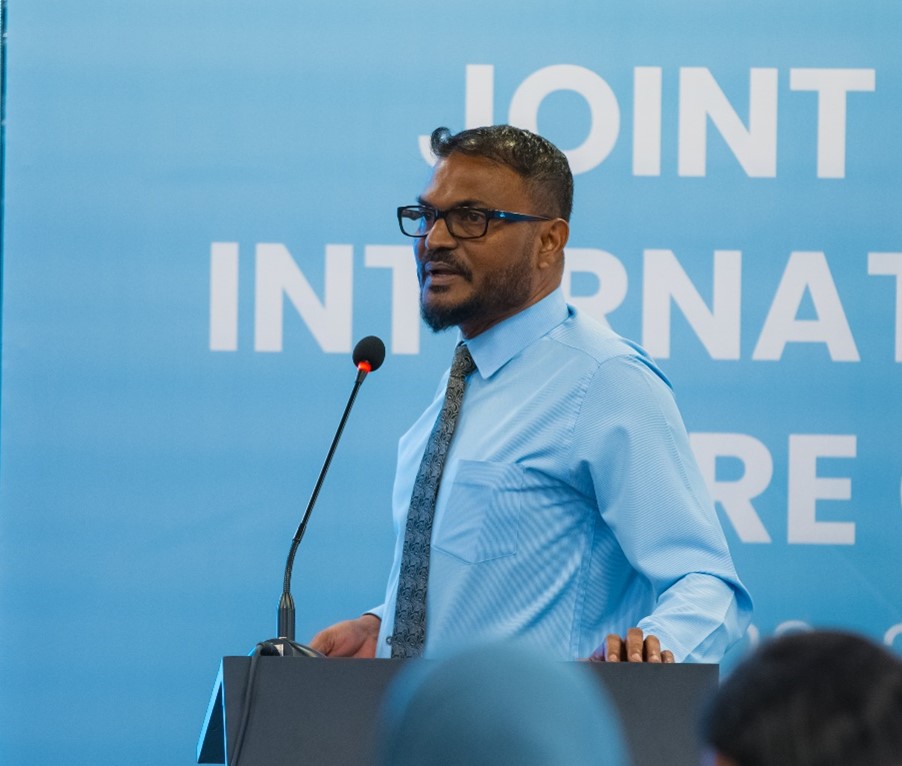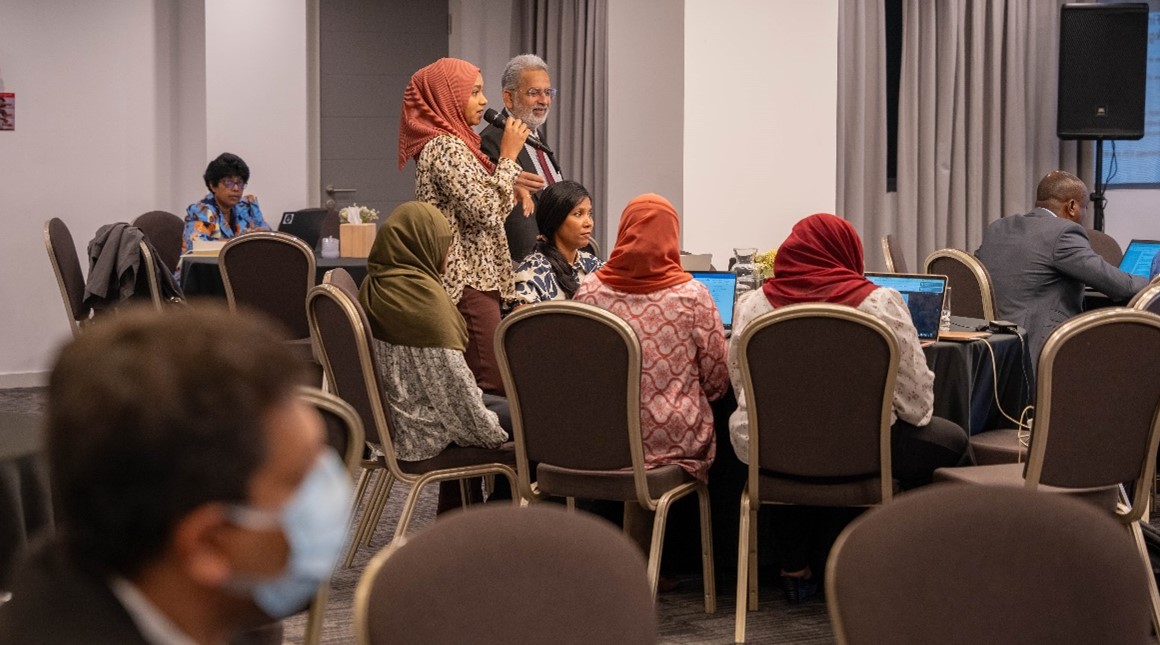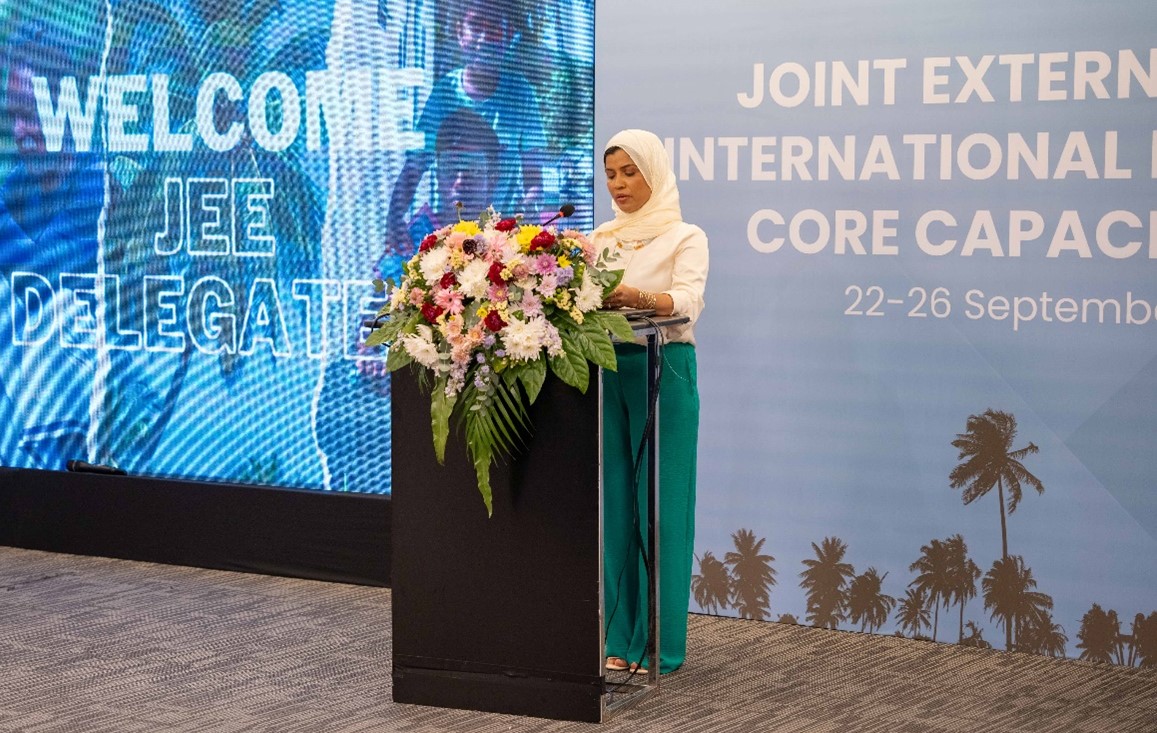Departmental update, 30 September 2024
The Republic of Maldives takes a significant step forward in improving its national health security by highlighting its strengths and identifying areas for improvement.
Male, Maldives
30 September 2024

Figure 1(Sitting, from left) Deputy Director General Aminath Shaina Abdulla, Ms Thasleema Usman, Quality Assurance and Regulation Division (QARD) of Ministry of Health (MoH), Dr Reuben Samuel, Co-lead, JEE Mission, WR (Acting) Maldives Dr Padmal, Dr Ahmed Ashraf, DGHS Maldives, Deputy Minister of Health Ahmed Hamdhaan Nasir, Permanent Secretary MoH Aishath Samiya, Dr Karen Sliter, Team Lead, JEE Mission, Deputy Director General Ibrahim Nishan Ahmed, Mr Hisaan Hassan, Chief Executive, National Disaster Management Authority (NDMA) (standing) Colleagues from the Ministry of Health, Maldives along with the JEE mission team members in Maldives.
The Republic of Maldives has successfully concluded its second Joint External Evaluation (JEE) of International Health Regulations (IHR) core capacities, marking a significant step forward in regional and global health security. This JEE uses the newly developed electronic JEE (eJEE) platform, which has the clear goal of streamlining, standardizing and making the reporting process more efficient. The joint evaluation, which was conducted from 22 to 26 September 2024, covered 19 Technical Areas related to IHR. For each Technical Area, Priority Actions were recommended to enhance the national health security and the resilience of the national health system for emergencies.
The Republic of Maldives became the fifth country in the South-East Asia Region and the 38th globally to conduct the second round of the JEE as of September 2024. The first JEE of Maldives was completed in 2017. The results from this latest evaluation will guide the development of a new National Action Plan for Health Security (NAPHS), which is a country-owned, multi-year plan with strategic and operational components. The NAPHS is designed to accelerate the implementation of interventions that sustain and strengthen IHR core capacities. Like the JEE, the NAPHS is based on a One Health, all-hazards, whole-of-government and societal approach.
During the opening session on Sunday, 22nd September - the first day of the mission, Mr Ibrahim Nishan Ahmed, Deputy Director General of Public Health at the Health Protection Agency (HPA) in the Maldives acknowledged the continued support from WHO and stated “We are confident this JEE will be a significant milestone in our health system, and strongly believe this will be a stepping-stone to developing a more comprehensive NAPHS. We will continue to strive and put in efforts to build a healthier and more resilient Maldives”.
Dr Karen Sliter, Team Lead for the external JEE team in Maldives stated, “It is clear that Maldives has made a strong commitment to and invested significantly in providing a high standard of health care to both those who live here and those who vacation here. Continued investments in Maldives’ health system must be made, including the areas of food safety and digitalization. The JEE external team has worked with Maldives experts to help ensure maximum benefit from these investments.”
Dr Reuben Samuel, Programme Area Manager—Country Health Emergency Preparedness and IHR, Health Emergencies Programme, WHO South-East Asia (SEA) Regional Office, and co-lead of the external JEE team emphasized that, “The WHO SEA regional strategic roadmap on health security and health system resilience for emergencies 2023-2027 emphasises the importance of not only the technical systems but also the financing and governance systems. The COVID-19 pandemic highlighted a critical gap in community engagement and resilience. In light of this, member states, WHO and partners have drafted a Strategic Action Framework on Strengthening Community Engagement and Resilience to Emergencies in the WHO SEA Region. Regional solidarity is crucial to ensure that countries can access capacities they do not have, as a right, with the implementation of the regional initiatives prioritized in the regional strategic roadmap and action frameworks. Following the assessment, the focus needs to be on systematic implementation of the recommendations through the new NAPHS, for improved health security ”.

Figure 2 Dr Ahmed Ashraf, Directorate General of Health Services, Ministry of Health and Family Welfare, Maldives addressing the JEE team in Maldives
Dr Ahmed Ashraf, Directorate General of Health Services, Ministry of Health and Family Welfare, Maldives, shared “We have learned several key lessons from the pandemic, including the importance of comprehensive health resource mapping and local capacity building, strengthening testing and integrated surveillance, designated isolation and quarantine facilities, multisectoral collaboration, and the necessity of control measures, ensuring continuity of essential health services during emergencies, and risk communication and community engagement. One of the most critical issues was the challenge of navigating misinformation and disinformation. This underscored the necessity of regular risk communication from the Ministry of Health in close collaboration with the designated media focal points in the country”. The DGHS also highlighted that currently the District Health Information System 2 (DHIS2) is being implemented rapidly for the management of public health information.
The JEE process is a peer-to-peer review and a highly collaborative effort involving experts from both external and host countries. This consensus-based process ensures full agreement on all aspects of the findings, including the capacity level scores, recommended priority actions, and the final report. Country experts, led by government representatives, are deeply involved and have full ownership of the process and results. Each technical area receives a score ranging from 1-5, indicating the level of capacity achieved by the country, with 3-5 recommended priority actions to advance to the next or sustainable level of capacity.

Figure 3 Focal point from the Ministry of Health, Maldives during one of the plenary sessions
After the opening session, field visits were conducted at a number of locations, including the National Health Laboratory (NHL), Maldives Food & Drug Authority (MFDA), Dharumavantha Hospital, National influenza centres (NICs) Lab) to observe the Health Service Provision (including isolation wards), Biosafety and Security, and Infection Prevention and Control (IPC) programmes. The National Emergency Operation Centre (NEOC) and the Health Emergency Operation Centre (HEOC) and the points of entry such Malé seaports and Velana International Airport were also visited during the first day of the mission.
This was followed by three and a half days of plenary sessions and group discussions when needed on each of the 19 technical areas. During these interactions, the focal points from the mandated line ministries, along with the external evaluators from the JEE team, took part in evidence based deliberations on the IHR core capacities of the Maldives in line with the details contained in the JEE tool to arrive at the consensus on the scores and the recommended priority actions.
During the concluding session on Thursday, 26th September - the fifth and final day of the mission, Dr Padmal, Medical Officer at the WHO Country Office of Maldives, on behalf of the WHO Representative shared that ‘"As the lead technical partner for health in the Maldives, WHO Maldives has been working collaboratively since 2020 post pandemic, to implement the 'Build Back Better' initiative. The JEE aligns perfectly with our shared goal of strengthening the overall health system. We leverage our expertise as a trusted partner to drive progress towards a stronger, more resilient Maldives."

Figure 4 The Minister of State for Health, Ms Aishath Shirna, addresses the audience on the 26th of September 2024.
Ms Aishath Shirna, Honorable State Minister of Health, Maldives, the Chief Guest during the concluding session of the JEE mission stated that “This has undoubtedly been an extensive and demanding process for all parties involved. Nevertheless, the recommendations from the JEE will guide us toward further improvements across all technical areas, while also serving as a valuable advocacy tool for policymakers. These recommendations will reinforce the government’s commitment to strengthening the IHR Core capacities and the public health system in the Maldives. I sincerely hope that the Ministry of Health, alongside other government ministries, with support of WHO and relevant agencies, will work diligently toward achieving the recommendations. Our response to the COVID19 pandemic showcased our resilience and strong commitment to public health preparedness and response. With the implementation of the JEE recommendations, the Maldives will be in an even better position to face emerging health threats of various magnitudes.”
A multisectoral group of 17 international experts from 10 countries representing 10 organizations, including the International Atomic Energy Agency (IAEA), Food and Agriculture Organization of the United Nations (FAO), and World Organization for Animal Health (WOAH) in addition to experts from the three levels (Maldives country office, New Delhi regional office and Geneva headquarters) of the World Health Organization (WHO) participated in and facilitated the successful completion of this second round of the JEE-IHR of the Republic of Maldives.
